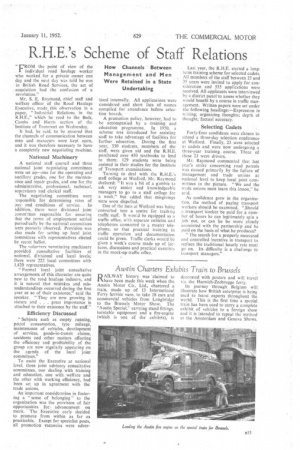R.H.E.'s Scheme of Staff Relations
Page 49

If you've noticed an error in this article please click here to report it so we can fix it.
" How Channels Between Management and Men Were Retained in a State Undertaking
FROM the point of view of the individual road haulage worker who worked for a private owner one day and the next day was told he was in British Road Services, the act of acquisition had the confusion of a revolution."
Mr. S. E. Raymond, chief staff and welfare officer of the Road Haulage Executive, made this observation in a paper, "Industrial Relations in the R.H.E.," which 'he read to the Beds, Cambs and Hunts section of the Institute of Transnort on Wednesday.
It had, he said, to be ensured that the channels of communication between men and managers were kept open, and it was therefore necessary to have a completely new negotiating machine.
National Machinery
A national staff council and three national joint negotiating committees were set up—one for the operating and ancillary grades, one for the maintenance and repair grades, and one for the administrative, professional. technical, supervisory and clerical staff.
The negotiating committees were vsponsible for determining rates of
pay and conditions of .service. In: addition; there were divisional joint committees responsible for ensuring that the terms of employment settled periodically by the national committees here pronerly observed. Provision was also made for setting up local joint eommittees with representatives elected by secret ballot.
The volurtarv neaotiating machinery provided consultative facilities at national, divisional and local levels; there were 222 local committees with 1,420 representatives.
" Formal local joint consultative arrangements of this character are quite new to the road haulage industry, and it is natural that mistakes and misunderstandings occurred during the first year or so of their existence," said the speaker, "They are now growing in stature and . great importance is attached to their existence by the staff."
Efficiency Discussed
" Subjects such as empty running, petrol consumption, tyre mileage, maintenance of vehicles, development of services, goods-in-transit claims, accidents and other matters affecting the efficiency and profitability of the group are now regularly appearing on the agenda of the local joint committees."
To assist the Executive at national level, three joint advisory consultative committees, one dealing with training and education, one with .welfare and the other with working efficiency, had been set up in agreement with the trade unions.
An important consideration in fostering a "sense of belonging" to the organization was the provision of fair opportunities for advancement on merit. —The Executive early decided to promote from within as far as practicable. Except for specialist posts, all promotion vacancies were adver
used internally. All applications were considered and short lists "of names compiled for attendance before selection boards.
A promotion policy, however, had to be accompanied by a 'training and education programme. In 1950, a scheme was introduced for assisting staff to take advantage of facilities for further education. During the first year, 530 students, members of the staff, were given aid and the R.H.E, purchased over 450 textbooks to lend to them; 129 students were being assisted in their studies for the Institute of Transport examinations.
Turning to deal with the R.H.E.'s staff college at Watford, Mr. Raymond declared: " It was a bit of a gamble to ask very senior and knowledgeable managers to go to a staff college for a week," but added that .misgivings were soon dispelled.
One of the huts at Watford was being .converted into a centre for training traffic staff. It would be equipped as a traffic office, with separate cubicles and telephones connected to a master telePhone, so that practical training in traffic operation and documentation could be given. Traffic clerks would be given a week's course made up of lectures, discussions and practical exercises in the mock-up traffic office.
Last year, the R.H.E. started a longterm training scheme for selected cadets. All members of•the staff between 25 and 35 years were invited to apply for .consideration and 555 applications were received. All applicants were interviewed by a district panel to assess whether they would benefit by a course in traffic management. Written papers were set under the following headings:—Expression in v, Elting; organizing thoughts; depth of thought; factual accuracy.
Selecting Cadets
Forty-four candidates were chosen to attend a three-day selection conference at Watford. Finally, 23 were selected as cadets and were now undergoing a three-year training course. Three of' these 23 were drivers.
Mr. Raymond commented that last year's strike concerning road patrols was caused primarily by the failure of management and trade unions at national level to keep local joint committees in the picture.. \\'e We and the trade unions must learn this lesson," he said.
As confidence grew in the organization, the method of paying transport workers should be examined., ".Should a transport Worker, be paid for a number of hours he can legitimately spin a job out, or can he be more closely associated with the partnership and be paid on the basis of what he produces?
The search for a properly measured and controlled incentive in transport to replace the traditional hourly rate must go on. Its difficulty is a challenge to transport managers."




















































































